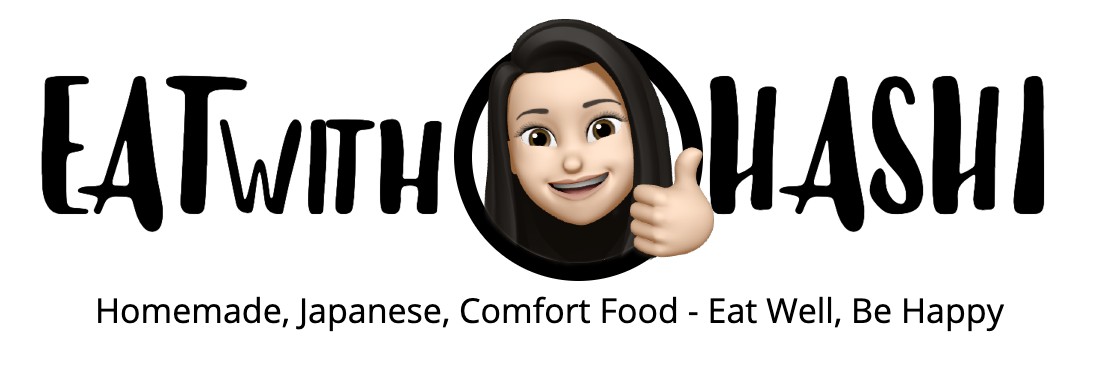Home / All Posts / Food Talk / EATwithOHASHI – What does it mean?
EATwithOHASHI – What does it mean?

You have probably thought, “what does EATwithOHASHI mean?” What is this “Ohashi” word all about? And maybe some of you thought that it was my name and therefore the site name means “Eat with Me!” 😀 Well, I don’t want to disappoint any of you, but sorry, I am not Mrs. Ohashi. ;P
“O-ha-shi” means “chopsticks” in Japanese. I mean, technically, “Ha-shi (はし/箸)” is the original word. In Japanese, we put “O (お)” at the beginning of a noun to say it politely. So “O-ha-shi (おはし)” is the polite way to say “chopsticks” in Japanese.
You can put “O” on noun words to say it politely, for example, soy sauce is “Shoyu (しょうゆ/醤油)” in Japanese and I call it “O-Sho-yu (おしょうゆ)”, or deep pan is “Nabe (なべ/鍋)” in Japanese and I call it “O-Na-be (おなべ)”. BUT, you can’t put “O” on every noun. The rule is not that simple. So we don’t say like “Oninjin” (Nin-jin means carrots) or like “Omirin” (Mirin means sweet cooking sake), etc. Seems a little complicated? Maybe. But if I go deeper about this rule, it will be one another big topic about Japanese, like a language class lesson for Japanese learners, so I’m gonna stop here.
To be honest, I don’t know how this rule works but I know which word can have it and which one not, because I grew up in Japan using and hearing Japanese, I guess. I think it’s like this: For native English speakers, “adjectives in English absolutely have to be in this order: opinion-size-age-shape-color-origin-material-purpose Noun.
So, you can have a lovely little old rectangular green French silver whittling knife. But if you mess with that word order in the slightest you’ll sound like a maniac. It’s an odd thing that every English speaker uses that list, but almost none of us could write it out. And as size comes before color, green great dragons can’t exist.” It’s a pretty interesting fact, isn’t it?
Well, back to the original topic. So our site name “EAT with OHASHI” means “EAT with Chopsticks!” I’m happy that now it’s clear to you. We, Japanese, traditionally use “Ohashi” when we eat food. We even have some shops specialty serves spaghetti dishes where they serve their dishes with “Ohashi” expecting their customer to eat spaghetti with them! We do use knifes and forks but “Ohashi” is our default “silverware”.
I do make several dishes which usually not being eaten with “Ohashi”, like pasta dish or steak, etc., but my first reason to start this website was for sharing Japanese food, dishes, and stuff related to Japanese food culture, so I decided to go with it for the site name.
Hope you like it and try some of my dishes with “Ohashi” today! Eat Well, Be Happy!
Sumiyo’s Recommended Products…
If you enjoyed reading this, you may like these…
-
 Takoyaki Recipe: Authentic Japanese Octopus Balls Recipe
A must try Takoyaki Recipe if you are a lover of Japanese street food! Takoyaki is a Japanese street food that originated in Osaka city. However, due to its popularity amongst…
Takoyaki Recipe: Authentic Japanese Octopus Balls Recipe
A must try Takoyaki Recipe if you are a lover of Japanese street food! Takoyaki is a Japanese street food that originated in Osaka city. However, due to its popularity amongst…
-
 Takoyaki is My Favorite Osaka Street Food, Perhaps I’m from Osaka, Not Tokyo?!
Takoyaki (たこ焼き) is one of the dishes, that I can proudly say I’m an expert at cooking! :)What is Takoyaki?Do you know what Takoyaki is? Takoyaki is a Japanese street food that…
Takoyaki is My Favorite Osaka Street Food, Perhaps I’m from Osaka, Not Tokyo?!
Takoyaki (たこ焼き) is one of the dishes, that I can proudly say I’m an expert at cooking! :)What is Takoyaki?Do you know what Takoyaki is? Takoyaki is a Japanese street food that…
-
 Spicy Miso Mayonnaise Dipping Sauce Recipe – Super Addictive!
This is a Japanese spicy miso mayonnaise dipping sauce. It’s highly addictive and tastes amazing on just about any kind of vegetables. Enjoy it as a very tasty afternoon snack…
Spicy Miso Mayonnaise Dipping Sauce Recipe – Super Addictive!
This is a Japanese spicy miso mayonnaise dipping sauce. It’s highly addictive and tastes amazing on just about any kind of vegetables. Enjoy it as a very tasty afternoon snack…



Very cool! Thanks for sharing and I love the little Japanese language lesson. Even the English bit, I was not even aware of. I guess it’s just natural and something we learn as natives. Very true…there are no green great dragons!
Thank you! It made me happy that this information helped my reader! For non-native English speakers, like me, there’s the only way to master the English word order just by memorizing I guess… Ganbari Masu (がんばります/I’ll try harder (or) my best)! 😉